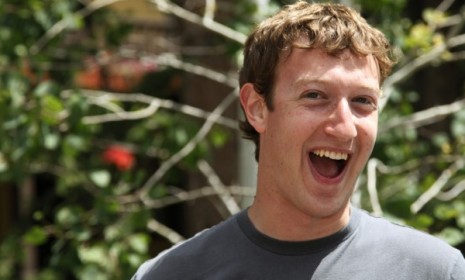Has 'The Social Network' helped or hurt Facebook?
Everyone's talking about the hit film, but what does the movie mean for its subject?

A free daily email with the biggest news stories of the day – and the best features from TheWeek.com
You are now subscribed
Your newsletter sign-up was successful
When The Social Network hit theaters, many critics speculated the film would be a "PR nightmare" for Facebook, with its founders coming off as greedy, misogynistic nerds. CEO Mark Zuckerberg donated $100 million to Newark schools a week before the film opened, and skeptics wondered whether he was just trying to counter a coming wave of bad press. But with the movie about the social-networking website's origins topping the box office two weekends in a row, and Oscar buzz already surfacing, a new study suggests The Social Network has been surprisingly kind to the Facebook brand. (Watch a Bloomberg discussion with the brothers suing Facebook.) Here's a quick guide to the findings:
What did the study find?
In the weeks surrounding the film's realease, young people actually started liking Facebook more. YouGov BrandIndex, a consumer perception research service, had participants rate their feelings on a scale of -100 to 100 every day. Perceptions among those between ages 18 and 34 grew twice as positive between Sept. 16 and Oct. 1, the day the film was released, and climbed higher until the study ended five days later. They weren't asked whether they had seen the movie, but with such a sharp uptick right around the film's release, says Caroline McCarthy at CNET, "it's difficult to argue that there wasn't a correlation somehow."
The Week
Escape your echo chamber. Get the facts behind the news, plus analysis from multiple perspectives.

Sign up for The Week's Free Newsletters
From our morning news briefing to a weekly Good News Newsletter, get the best of The Week delivered directly to your inbox.
From our morning news briefing to a weekly Good News Newsletter, get the best of The Week delivered directly to your inbox.
Did everyone react so positively?
No — respondents over 50 had a different reaction. This is typically the demographic with the dimmest view of Facebook, and the site was already struggling against bad publicity over privacy issues. With anticipation building in the two weeks before the film came out, people over 50 reported increasingly negative feelings about Facebook. People in the 35 to 49 age group had mixed feelings, with their opinions on the website bouncing up and down over the test period.
Why did young people react so differently?
The study didn't get into that, so it's still a bit of a mystery. But there are theories. "With its young cast, edgy electronic soundtrack, and plethora of scenes set in college dorms and at parties," says McCarthy, "the film is skewed toward an appeal to young audiences in the first place." And even though Zuckerberg is depicted as "a harsh megalomaniac," the movie is a "sexy, stylized look at Silicon Valley" that makes Facebook seem cooler than it is in "real life."
A free daily email with the biggest news stories of the day – and the best features from TheWeek.com
So will this help or hurt Facebook in the long run?
The news might be good in the short run. The "media buzz" has people talking about Facebook, and that is good for any brand, says Christina Warren at Mashable. And those young people who think more highly of Facebook are the site's most important demographic — for now. But Facebook has more and more users all the time, so their take on the movie could become more important over time, now that The Social Network's depiction of Facebook's history becomes part of the company's "historical lore."
Sources: Mashable, CNET, Tech Crunch
-
 Political cartoons for February 16
Political cartoons for February 16Cartoons Monday’s political cartoons include President's Day, a valentine from the Epstein files, and more
-
 Regent Hong Kong: a tranquil haven with a prime waterfront spot
Regent Hong Kong: a tranquil haven with a prime waterfront spotThe Week Recommends The trendy hotel recently underwent an extensive two-year revamp
-
 The problem with diagnosing profound autism
The problem with diagnosing profound autismThe Explainer Experts are reconsidering the idea of autism as a spectrum, which could impact diagnoses and policy making for the condition